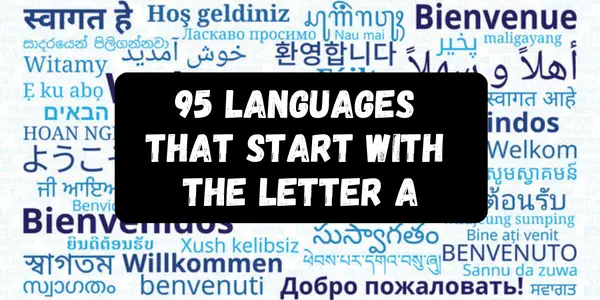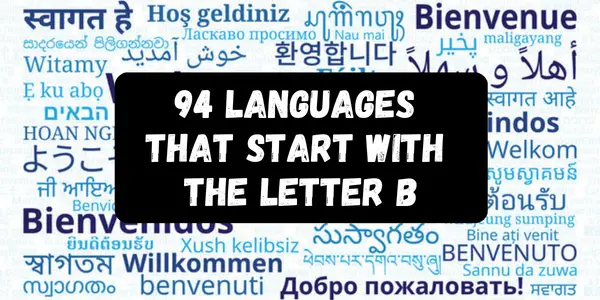Have you ever wondered about the vast array of languages that start with the letter E? Wonder no more, you have come to the right place.
In this article, I will embark on a linguistic journey, delving into the rich tapestry of languages that begin with the letter E. From the ancient to the modern, from the exotic to the widely spoken, these captivating languages hold a treasure trove of culture and history
So, without further ado, let’s dive into the fascinating realm of languages that start with E and witness the beauty they bring to our world.
Languages That Start With The Letter E
The followings are some of the most known and lesser-known languages that begin with the letter E (In alphabetical order):
1. E. Syriac: E. Syriac, also known as Eastern Syriac or Assyrian Neo-Aramaic, is an Aramaic language spoken by the Assyrian community in the Middle East. It has a rich literary tradition and serves as an essential medium for preserving the cultural identity of Assyrians.
2. Edo: Edo, also known as Bini, is a language spoken in Nigeria, primarily in the Edo State. With a history that dates back to the ancient Benin Empire, Edo plays a crucial role in expressing the cultural heritage of the Edo people.
3. Efik: Efik is a Niger-Congo language spoken in Nigeria, particularly in the Cross River State. It serves as an important marker of the Efik cultural identity and is used in various aspects of their daily life.
4. Ekoi-Nde: Ekoi-Nde, also known as Ejagham, is a Cross River language spoken in Nigeria and Cameroon. It is used by the Ekoi and Ejagham communities and reflects their unique cultural practices.
5. Enets: Enets is a critically endangered language spoken by the Enets people in northern Siberia, Russia. With only a handful of speakers left, Enets is an important reminder of the linguistic diversity and the need for language preservation efforts.
6. Enga: Enga is a Papuan language spoken in Papua New Guinea. With its distinct linguistic features, Enga holds cultural significance for the Enga people.
7. English: English is one of the most widely spoken languages globally and serves as a lingua franca for communication between speakers of different native languages. As the dominant language in various regions, English has a profound impact on global culture and communication.
8. English (Australian): English (Australian) refers to the variety of English spoken in Australia. It has its own unique accent, vocabulary, and cultural influences, reflecting the Australian identity.
9. English (UK): English (UK) represents the standard variety of English spoken in the United Kingdom. It has a rich literary tradition and serves as a marker of British culture.
10. Erse (Gaelica): Erse, also known as Irish Gaelic or Gaeilge, is a Celtic language spoken in Ireland. As one of the official languages of Ireland, Erse plays a crucial role in preserving Irish culture and heritage.
11. Erzya: Erzya is a Finno-Ugric language spoken in Russia, particularly in the Mordovia Republic. It is used by the Erzya people and has its own unique linguistic features.
12. Eskimo: “Eskimo” is a term used to refer to the indigenous peoples of the Arctic regions in North America and Siberia. The Eskimo-Aleut language family includes languages like Inuktitut and Yupik, which are spoken by various Eskimo communities.
13. Esperanto: Esperanto is an artificial language created by L. L. Zamenhof in the late 19th century with the aim of fostering international communication and understanding. Although not a native language, Esperanto is spoken by a global community of speakers and continues to promote cultural exchange.
14. Estonian: Estonian is a Finnic language spoken in Estonia. As the official language of the country, Estonian is an essential part of Estonian identity and culture.
15. Estrangela: Estrangela is an ancient script used for writing Syriac and other Aramaic languages. It has historical importance and is an integral part of Syriac’s cultural heritage.
16. Estrangelo: Estrangelo is another ancient script used for writing Syriac and other Aramaic languages. Like Estrangela, it holds cultural significance for Syriac speakers.
17. Ethiopic: Ethiopic is an ancient script used for writing Ge’ez, Amharic, and other languages in Ethiopia. It has historical importance and reflects the rich literary tradition of the region.
18. Even: Even, also known as Lamut, is a Tungusic language spoken in Russia, particularly in the Sakha Republic. It has a unique linguistic structure and serves as a marker of the Even cultural identity.
19. Evenki: Evenki is another Tungusic language spoken in Russia, particularly in the Siberian and Far Eastern regions. It is used by the Evenki people and has several dialects.
20. Ewe: Ewe is a Niger-Congo language spoken in Ghana, Togo, and Benin. It is used by the Ewe people and has a rich oral tradition and cultural heritage.
I hope you found this article “Languages That Start With E” helpful and got insights into some of the rare and lesser-known languages around the world.
Also, keep in mind that, this isn’t an exhaustive list if there are any Languages starting with the letter E.
Feel free to leave a comment below with the missing Languages and I’ll update the list as soon as possible.
And, if you’d like to explore more Languages starting with different letters of the alphabet, click the link below:
- Languages That Start With F
- Languages That Start With G
- Languages That Start With H
- Languages That Start With I

